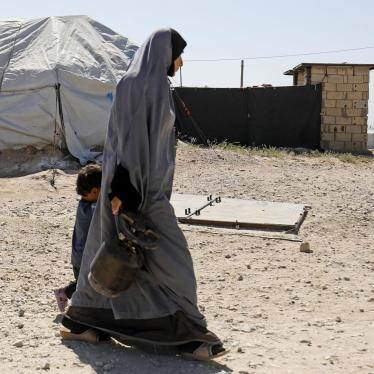Iran should immediately suspend the use of the death penalty for crimes committed by children under age 18, Human Rights Watch said today.
Iran is known to have executed at least 17 juvenile offenders since the beginning of 2004 – eight times more than any other country in the world.
Iran’s highest judicial authorities have repeatedly upheld death sentences handed down to juvenile offenders charged with committing crimes when they were as young as 15. Such sentences violate Iran’s international treaty obligations, which prohibit the death penalty for crimes committed by people under 18. In some cases, the death sentences also violate Iranian domestic law requiring that children under 18 be tried before special juvenile courts.
“Iran holds the deplorable distinction of leading the world in juvenile executions, and the authorities should end this practice at once,” said Clarisa Bencomo, children’s rights researcher on the Middle East at Human Rights Watch. “The Iranian government needs to stop sending children to the gallows and start living up to its international obligations by issuing clear legislation to ban the juvenile death penalty.”
Iran is known to have executed two juvenile offenders already this year. Syed Mohammad Reza Mousavi Shirazi, 20, was executed in Adel Abd prison in the city of Shiraz on April 22 for a murder he allegedly committed when he was 16. His family was not notified of the planned execution and did not see him prior to the execution.
Documents in Human Rights Watch’s possession show that both the lower court and the Supreme Court acknowledged that Mousavi was wrongly tried in an adult court. Nevertheless, the Supreme Court rejected Mousavi’s request for a retrial before a juvenile court, accepting the lower court’s argument that it was in effect “acting in place of a juvenile court.” The Supreme Court confirmed the death sentence, stating “in the light of the direct confession of the accused and the rest of the evidence presented against him, the court sees no significant flaws or shortcomings in the proceedings.” Torture and ill-treatment are common in Iranian detention centers, making the court’s willingness to accept a child’s confession in a death penalty case particularly disturbing.
In a separate case, Iranian authorities executed 17-year-old Sa'id Qanbar Zahi in Zahedan on May 27. According to press accounts, Zahi’s arrest, confession, trial, sentencing, and execution took place in the space of a few weeks. If true, these factors raise serious doubts that the 17-year-old was able to mount a meaningful defense, and raise further serious concerns about whether other basic fair trial standards were met.
Iranian officials have repeatedly stated that they are working to comply with Iran’s legal obligations by ending executions of child offenders. High-ranking Judiciary officials have repeatedly said that no juvenile executions take place in Iran. On October 1, the chief of Tehran’s Judiciary, Alireza Avaii, told reporters that “our current policy is that execution sentences for juveniles not be implemented and it has been a long time that any such executions have taken place.”
Iranian officials also point to legislation that would establish a new legal framework for juvenile courts, pending in parliament since July 2006, and claim that it would end executions of juvenile offenders. In fact, this legislation would only offer the possibility of reducing sentences if the judge finds that the defendant is not mentally mature. The proposed legislation (Article 33) makes clear that reduction of sentences in qisas and hadd crimes, for which punishment includes execution, shall be applied “when the complete mental maturity of the defendant is in doubt.” Qisas crimes are offenses against a private right where the victim is entitled to a similar retribution, and hadd crimes are offenses with punishments specified under the Islamic penal code.
Article 31.3 of the proposed law would allow a sentence of the death penalty or life imprisonment, if imposed on juvenile defendants ages 15 to 18, to be reduced to a term of imprisonment ranging from two to eight years in a juvenile correctional facility. The majority of juvenile executions in Iran are for qisas and hadd crimes, where judges would continue to have discretion to order executions, if the mental maturity of the defendant is determined by the judge not to be in doubt.
“Iran has had more than enough time to demonstrate its commitment to ending the juvenile death penalty,” Bencomo said. “The government now needs to take urgent, concrete steps to end this practice.”
Human Rights Watch called on the Iranian parliament to remove from the proposed law the discretion for a judge to impose the death sentence on a juvenile offender. Parliament should also pass the remainder of the proposed legislation mandating reduction of sentences as soon as possible. Human Rights Watch also urged the Council of Guardians, a clerical body with veto power over adopted legislation, not to oppose the proposed legislation.
Only Iran, Sudan, China and Pakistan are known to have executed juvenile offenders since 2004. Sudan carried out two such executions in 2005, while China executed one juvenile offender in 2004 and Pakistan executed one juvenile offender in 2006. In contrast, Iran is known to have executed at least three juvenile offenders in 2004, eight in 2005, and four in 2006. In total numbers, only China carries out more executions than Iran. On a per capita basis, Iran executes more people annually than any other country.
Two core international human rights treaties, the Convention on the Rights of the Child and the International Covenant on Civil and Political Rights, prohibit the imposition of the death penalty for crimes committed before the age of 18. Iran has ratified both treaties.






